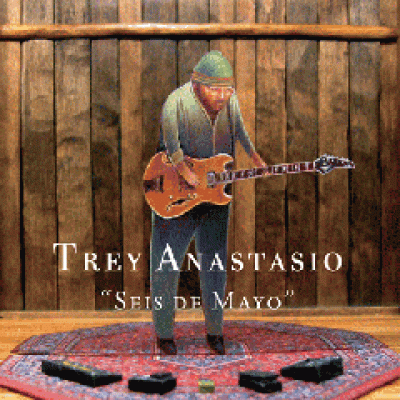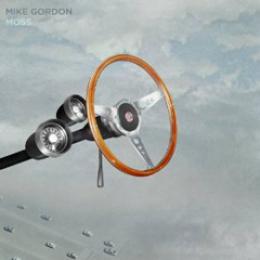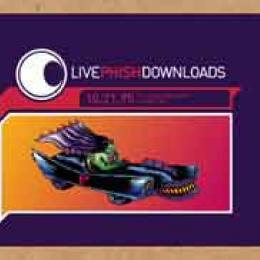Posted by: Anonymous | May 1st, 2004
His interest in orchestral music and passion for composing were evident in even the earliest pieces in the Phish repertoire. While at Goddard College, he studied with renowned atonal composer Ernie Stires, and always dreamed of commanding a full orchestra of his own. The atmosphere is set with the mellow mood of the African-tinged "Andre the Giant." The organic thump of Abou Sylla's balafon, which is an African xylophone-like instrument, intermixes exquisitely with Fode Bangoura's djembe to produce a vibrant yet laid-back percussive bed. Phish's Mike Gordon lays down the chipper bassline while Anastasio's acoustic picks out the merry melody. This track features, like so much of his music, an upbeat buoyancy with just a tinge of melancholy.
The second track is a sprightly, cautiously joyous piece which has already come through several permutations. The song first emerged as "Nothing But an 'E' Thing" in his solo band setlists, later became the opening section of Phish's "Pebbles and Marbles" on their 2002 release Round Room, and reappears here performed by 15 classical musicians as "Prologue." He relishes on filling in even the tiniest holes in this piece, as the rhythmic pulsations of Tom Toner's marimba hover under the swelling violins and wind instruments. The song is conducted by Troy Peters, who hardcore fans will remember as Music Director and Conductor of the Vermont Youth Orchestra. Anastasio and the VYO previously worked together on a 2001 reworking of Phish's "Guyute" for a special live performance, which is available on the Mockingbird Foundation's charitable Phish tribute album Sharing in the Groove. Later in Seis de Mayo, Anastasio and Peters take a new crack at "Guyute," but the next track is a reworking of a different Phish song.
"The Inlaw Josie Wales," from Phish's 2000 album Farmhouse, gets a complete makeover courtesy of The Ying Quartet. Peters' string arrangement showcases the two violins, viola and cello blending elegantly with Anastasio's acoustic guitar flourishes. "All Things Considered," which originally appeared on Phish's 1994 release Rift, is the most stringent, frenetically paced piece on the album. Also featuring the Ying Quartet, this is not pleasant, pastoral classical music but rather a sonic onslaught of ascending anarchy and descending disarray. Beginning with the dark, tribal drum rhythms of Phish's Jon Fishman, "Coming To" drifts into '60s spy movie music with a Middle Eastern-classical ambience. As the horns begin to shine through, it twists into a brass band and flute flavored Americana tune. Jennifer Hartswick's trumpet and Andy Moroz' trombone, both from Anastasio's solo band, plus a half dozen other musicians, mesh together to glide through the elusive melody.
Hartswick and Moroz remain for "Discern (Intro)," as their bandmates Peter Apfelbaum on tenor sax, Dave Grippo on baritone sax and Russell Remington on tenor sax appear. Although the full band is much larger, this is the only song on the album populated entirely by Anastasio's solo band members. Also tackled by both his solo band and Phish, the forlorn horns and hapless brass spin a sad yet sublime story. The album wraps up with the majestic, soaring sound of "Guyute," as performed by Seattlemusic, a 66-piece ensemble which also focuses extensively on film scoring. This piece takes up nearly half the album, clocking in at almost 12 minutes. First released on Phish's 1998 album "The Story of the Ghost," this new version was orchestrated by Anastasio with Peters, who also conducted. The epic, sweeping scope of the song ranges from the delicate sonic subtleties of a Celtic reel to the pounding idyllic sonorities of orchestral grandeur, wrapping up the album with its most powerful song.
This record represents a bold new step in Trey Anastasio's career. He finally has the resources and opportunity to write and record the classical music he's been hearing in his head for so many years. Perhaps it's not a coincidence that four of the five Phish songs covered here are from 1998 or later. He's even lined up to lead the Nashville Chamber Orchestra through a classical set at this year's Bonnaroo festival before a set by his solo band. If the past is any indication, we should have no idea what to expect next.
-- Paul Kerr
The second track is a sprightly, cautiously joyous piece which has already come through several permutations. The song first emerged as "Nothing But an 'E' Thing" in his solo band setlists, later became the opening section of Phish's "Pebbles and Marbles" on their 2002 release Round Room, and reappears here performed by 15 classical musicians as "Prologue." He relishes on filling in even the tiniest holes in this piece, as the rhythmic pulsations of Tom Toner's marimba hover under the swelling violins and wind instruments. The song is conducted by Troy Peters, who hardcore fans will remember as Music Director and Conductor of the Vermont Youth Orchestra. Anastasio and the VYO previously worked together on a 2001 reworking of Phish's "Guyute" for a special live performance, which is available on the Mockingbird Foundation's charitable Phish tribute album Sharing in the Groove. Later in Seis de Mayo, Anastasio and Peters take a new crack at "Guyute," but the next track is a reworking of a different Phish song.
"The Inlaw Josie Wales," from Phish's 2000 album Farmhouse, gets a complete makeover courtesy of The Ying Quartet. Peters' string arrangement showcases the two violins, viola and cello blending elegantly with Anastasio's acoustic guitar flourishes. "All Things Considered," which originally appeared on Phish's 1994 release Rift, is the most stringent, frenetically paced piece on the album. Also featuring the Ying Quartet, this is not pleasant, pastoral classical music but rather a sonic onslaught of ascending anarchy and descending disarray. Beginning with the dark, tribal drum rhythms of Phish's Jon Fishman, "Coming To" drifts into '60s spy movie music with a Middle Eastern-classical ambience. As the horns begin to shine through, it twists into a brass band and flute flavored Americana tune. Jennifer Hartswick's trumpet and Andy Moroz' trombone, both from Anastasio's solo band, plus a half dozen other musicians, mesh together to glide through the elusive melody.
Hartswick and Moroz remain for "Discern (Intro)," as their bandmates Peter Apfelbaum on tenor sax, Dave Grippo on baritone sax and Russell Remington on tenor sax appear. Although the full band is much larger, this is the only song on the album populated entirely by Anastasio's solo band members. Also tackled by both his solo band and Phish, the forlorn horns and hapless brass spin a sad yet sublime story. The album wraps up with the majestic, soaring sound of "Guyute," as performed by Seattlemusic, a 66-piece ensemble which also focuses extensively on film scoring. This piece takes up nearly half the album, clocking in at almost 12 minutes. First released on Phish's 1998 album "The Story of the Ghost," this new version was orchestrated by Anastasio with Peters, who also conducted. The epic, sweeping scope of the song ranges from the delicate sonic subtleties of a Celtic reel to the pounding idyllic sonorities of orchestral grandeur, wrapping up the album with its most powerful song.
This record represents a bold new step in Trey Anastasio's career. He finally has the resources and opportunity to write and record the classical music he's been hearing in his head for so many years. Perhaps it's not a coincidence that four of the five Phish songs covered here are from 1998 or later. He's even lined up to lead the Nashville Chamber Orchestra through a classical set at this year's Bonnaroo festival before a set by his solo band. If the past is any indication, we should have no idea what to expect next.
-- Paul Kerr






